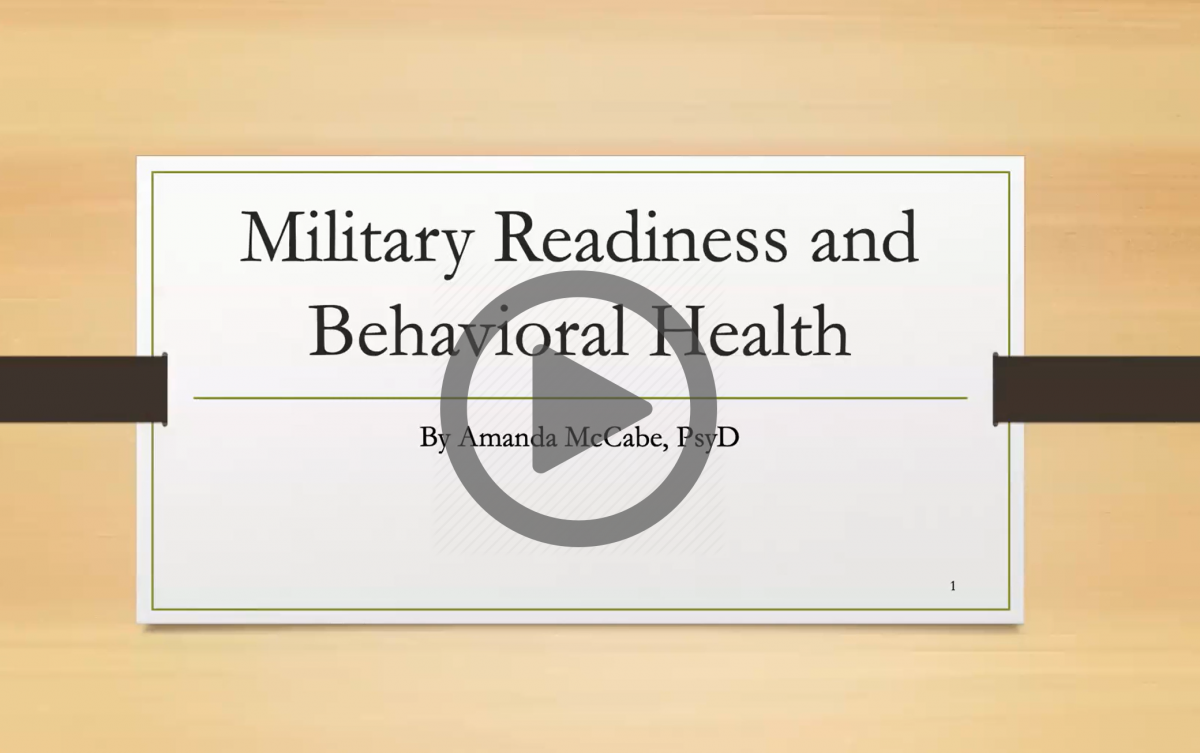Welcome to the Center for Deployment Psychology’s TRICARE Provider Readiness trainings!
PLEASE BE ADVISED:
The current Tricare Provider Readiness Designation (TPRD) asynchronous courses are sunsetting. The courses will become unavailable to new registrants on 1 November 2025, and enrolled participants will have until 15 November 2025 to complete all courses.
In their place, new live, instructor-led workshops will be available approximately once a quarter, the completion of which will satisfy the requirements for the Tricare Provider Readiness Designation. The next live TPRD workshop is scheduled for 1-2 December 2025. To register, or for more information, please visit http://deploymentpsych.ce21.com/item/tricare-provider-readiness-designation-138855. Additional live training workshops will be 28-29 January, 11-12 March and 12-13 May 2026. Watch this page for registration information.
History and Background
The National Defense Authorization Act (NDAA) for Fiscal Year (FY) 2016 required the development of a system where non-DoD (TRICARE) mental health care providers who meet eligibility criteria established by the Secretary of Defense, could receive a mental health Provider Readiness Designation. These providers would then be specifically highlighted in the TRICARE directory as having earned this designation.
As behavioral health providers who work with military service members, we hear the term ‘readiness’ often and may wonder what it means and how it could impact our work with our military clients. Generally speaking, readiness refers to the military’s capability to do its job, whether that’s during training, combat operations, or humanitarian missions. In order to ensure that the military can meet its missions, commanders need to know if their service members are able to deploy or work in an austere environment for an extended period of time. This blog series by Dr. Amanda McCabe, former Army psychologist, provides insights for civilian mental health providers on our role in readiness of our military clients.
- Part 1: "What is Readiness and Why is it So Important?"
- Part 2: "Overview of Military Readiness Assessments"
- Part 3: "Private Sector Providers and Readiness"
Additionally, in the videos below, you can watch Dr. McCabe walk providers through the background and importance of military readiness, as well as reviewing the steps to conduct these specific assessments. The first video focuses on the definition and background, while the second video highlights when these assessments occur, as well as the criteria reviewed during these evaluations.
Video Two: Military Readiness and Behavioral Health
TRICARE Provider Readiness Designation and Trainings
To receive this designation, providers must demonstrate knowledge related to military culture and evidence-based treatments that have been approved by the Department of Defense for the treatment of mental health issues among members of the Armed Forces. This is demonstrated by completing the package of courses listed on this site which have been developed by the Center for Deployment Psychology and approved by the Government.
The six (6) courses are:
- Military Culture: Enhancing Clinical Competence
- The Deployment Cycle and Its Impact on Service Members and Their Families
- Assessing Military Clients for Trauma and Post-Traumatic Stress Disorder
- An Overview of Sleep Disorders Common in Military Members
- Addressing Suicide with Military-Connected Patients
- Ethical Considerations for Working with Military Members and Veterans
Each of the training modules can be taken independently. Upon completion of all six training modules, participants will be eligible to receive a total of 14.5 Continuing Education (CE) credits through either the American Psychological Association (APA) or the Association of Social Work Boards (ASWB).
Process and Next Steps
1) Register and review each of the 6 training modules by clicking on the training modules tab.
Our site has limited capacity to process new registrations each week. We will open each Monday and will remain open until our capacity is reached. If you receive notice that the trainings are not available, we suggest checking back the following week.
2) Complete post-course evaluation for each module
3) Pass CE post-test for each module
4) Once you’ve completed all 6 course activities, your name and NPI number will be forwarded to the Defense Health Agency (DHA) and TRICARE
Please note: Before registering for a course, please ensure you have sufficient time allotted to complete the course. As each course must be completed in one sitting. If you exit in the middle of a course, you will NOT be able to resume your progress in the module.
Questions specific to TRICARE
If you have TRICARE-specific questions, please contact your TRICARE division at:
TriWest: 1-888-TRIWEST (874-9378)
Humana: 1-800-444-5445
Questions specific to registration or course access
For questions about registration or problems accessing the training, please contact CDP's TPRD team at: cdp-tpr-ggg@usuhs.edu


